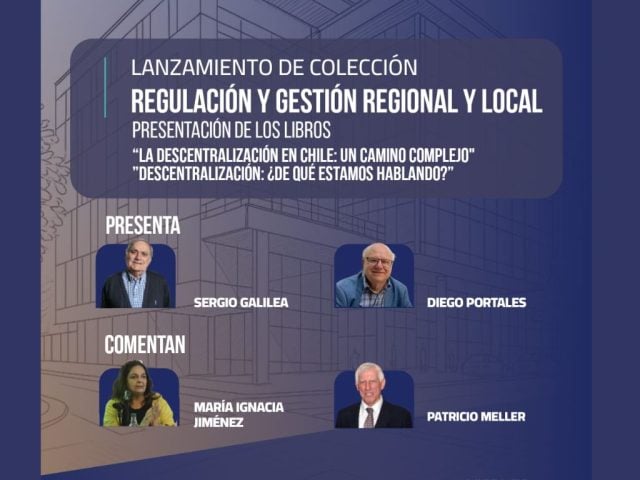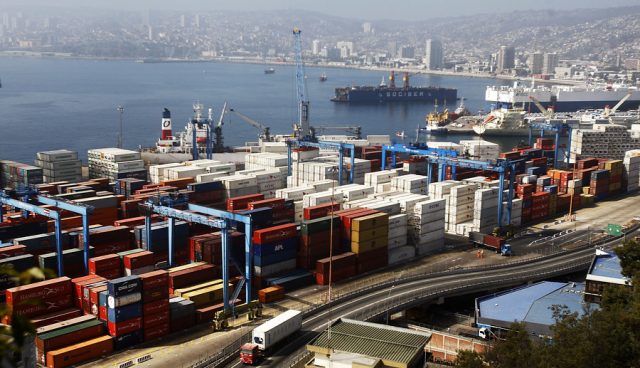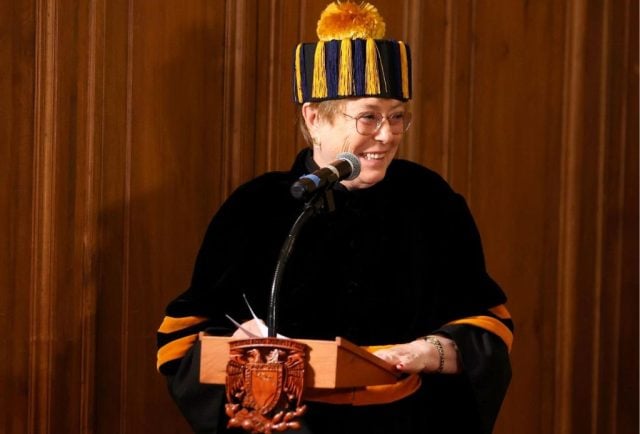Original article: Universidad de Chile presenta colección sobre descentralización y desarrollo regional
On Friday, November 7th, the University of Chile will unveil the collection «Regulation and Local and Regional Development», produced by the Center for Public Policy Analysis (CAPP), at 11:30 AM in the auditorium of the Faculty of Government.
This event, organized by the Faculty of Government of the University of Chile through CAPP and the Master’s program in Regional and Local Management and Development, will feature presentations by Sergio Galilea and Diego Portales, with commentary from María Ignacia Jiménez and Patricio Meller. Two books will be presented during the occasion.
The first book, «Decentralization in Chile: The Challenge of Complexity», authored by Sergio Galilea Ocón and Samuel Garrido Ruiz, explores the historical trajectory of the decentralization process in the country, its intergovernmental tensions, and the challenges for the next ten years.
The second book, «Decentralization: What Are We Talking About?», by Diego Portales, examines how the decentralization process is experienced from the regions, highlighting challenges, tensions, and opportunities to advance territorial equity and local development.
This event will be streamed live on the YouTube channel of the Faculty of Government, creating a space to analyze the progress, challenges, and future prospects of the decentralization process in Chile alongside notable experts.
In an interview with El Ciudadano, academic Sergio Galilea emphasized the significance of this event, noting that many people are still not fully aware of the complexities surrounding decentralization, an area that—according to him—requires information, reflection, and understanding, as it’s neither a simple nor superficial topic. He added that the University of Chile has made sustained efforts to encourage discussions on decentralization and regional development.
Galilea further explained that his book, co-authored with Samuel Garrido, synthesizes over a century of debate about decentralization in Chile and illustrates how, despite some advancements, progress has been gradual and limited compared to the magnitude of the challenges faced.
«When reviewing the long history of a country that is extremely centralized like ours, this is serious, because robust decentralization would contribute to economic development, production diversification, equality efforts, poverty alleviation, and also to modernizing public management and enhancing social participation, thus helping to overcome poverty,» stated Galilea.
Advancements and Challenges in Chile’s Decentralization
Since the 1990s, Chile has pursued a gradual process of decentralization, characterized as the transfer of competencies, responsibilities, and resources from the central government to regional and local governments. These changes aim to provide greater autonomy to territories in decision-making while strengthening democracy through increased citizen participation.
The most significant progress in recent decades regarding decentralization in our country has primarily been in the administrative dimension, marked by milestones such as: the establishment of Regional Governments in 1991, the direct election of regional councilors in 2014, and the historic election of regional governors in 2021.
Despite these advancements, significant gaps remain in political and fiscal areas. In fact, according to the OECD, Chile is still among the most centralized countries in the organization, with limited financial autonomy in its regions and municipalities.
Academic Patricio Meller, in conversation with the University of Chile, emphasized that while regions can now make some independent decisions, the distribution of resources continues to rely on the central level, which restricts true regionalization.
Although several legal reforms have been consolidating advancements in the election of authorities and the transfer of competencies, fiscal decentralization remains a major challenge, as there is still no Regional Revenue Law to enhance local income and financial autonomy for territories.
For Galilea, one of the main challenges today regarding decentralization is the coexistence of presidential delegates and regional governors, as there are limitations on competition and concrete action for regional development.
«I believe we need to legally refine this to establish or reaffirm that the governor holds authority over regional development, while the delegate represents the President of the Republic on matters related to security, internal governance, and so on. Thus, I think the possibility of narrowing down the delegate’s powers while expanding and reaffirming the governor’s competencies is something that should be relatively mature and could be approved during 2026,» the academic declared.
Therefore, the challenge for the coming years will be to strengthen regional and municipal governments, advance fiscal decentralization, and establish an institutional framework capable of coordinating public policies from the territories, with active citizen participation and a vision for balanced and inclusive development throughout the country.
Center for Public Policy Analysis
The Center for Public Policy Analysis at the University of Chile is a research institute aimed at contributing to and influencing the promotion of knowledge and analysis to address public issues in areas such as the Environment, Spatial Planning, Climate Change, Decentralization, and Subnational Governments. This is achieved through research, teaching, and consultancy activities that contribute to national debate and promote informed, sustainable, and resilient policy decisions.
To participate in the event, you can register by clicking here.










